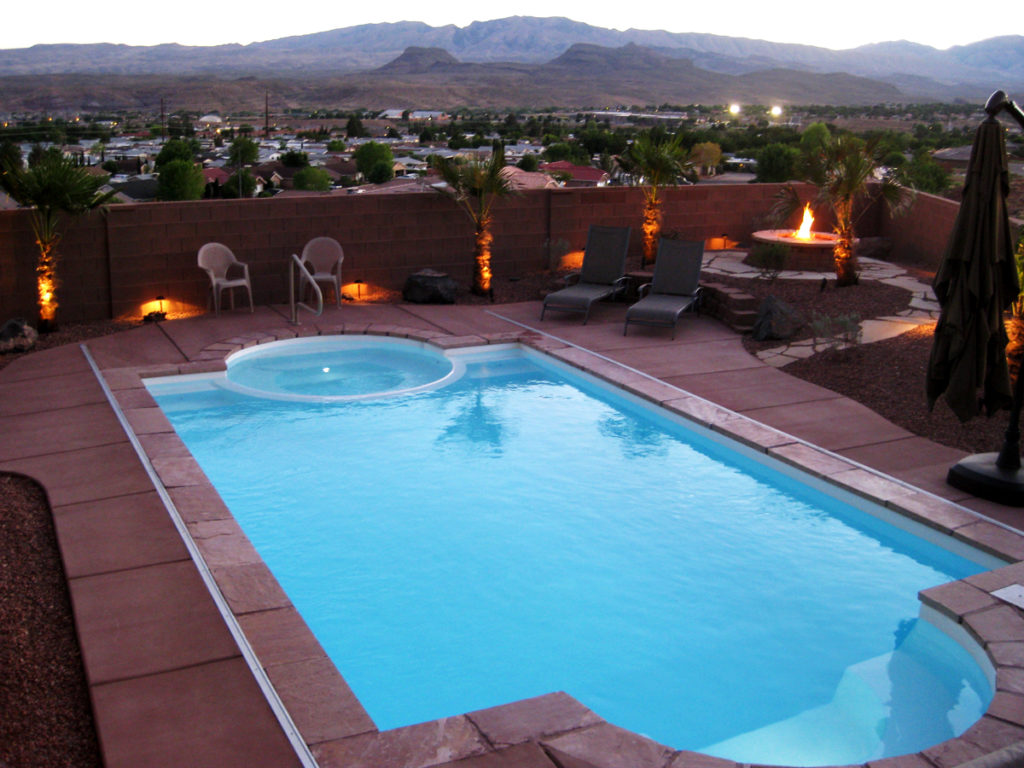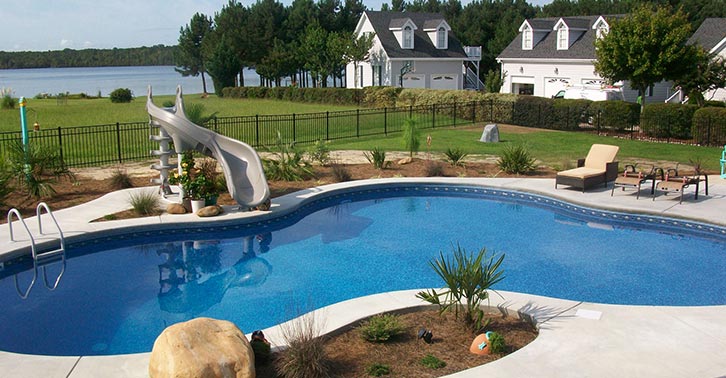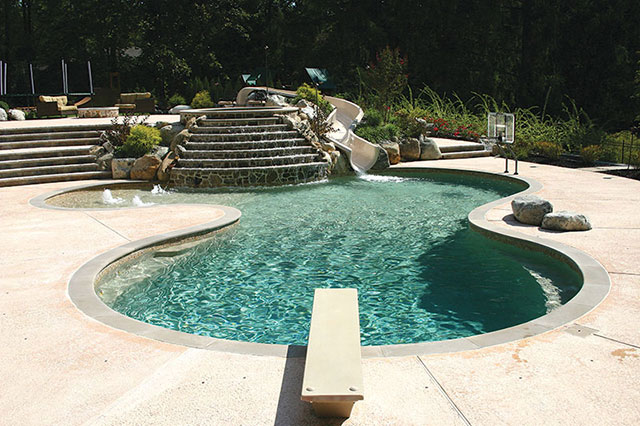It’s the ultimate matchup: fiberglass vs vinyl vs concrete pools
Which one is right for you?
Find out in this post
Fiberglass vs Vinyl vs Concrete Pools: What type of pool is best?
Ah, the great debate of fiberglass vs vinyl vs concrete pools. Everyone wants to know what type of pool is best. And right up front, we have the perfect answer: it’s entirely dependent on what you want out of your pool.
Naturally, preferences vary from pool owner to pool owner. While some want simplicity and convenience, others opt for space and customizability.
But the fact is, all three pool types serve their purpose perfectly, so we won’t be playing favorites in this post. What’s important is understanding the advantages and disadvantages of each, and how they align with your preferences as a pool owner. That way, you’ll have all the knowledge necessary to choose the pool that’s best for your lifestyle, swimming habits, and budget.
So keep reading for an honest comparison of fiberglass vs vinyl vs concrete pools. But first, a common question that needs an answer.
What is an inground pool made of?
If you’re thinking of your neighborhood pool or the public pool down by the park, then the answer is likely concrete. But if you’re talking about any one of the pools in backyards across America, then you could be dealing with fiberglass, vinyl liner, or concrete pools. This post will make it easy to determine which is which.
Fiberglass vs Vinyl vs Concrete Pools
Advantages and Disadvantages



Fiberglass Pools
What is a fiberglass swimming pool?
A fiberglass swimming pool is the only type of pool that comes pre-assembled. From the pool frame itself to the stairs, ledges, and built-in in ladders. Fiberglass pools are molded into a variety of factory designed shapes and sizes ready for quick installation. Their simplicity has made them a popular choice among pool owners, but let’s explore why.
Initial Cost: $45,000.00 to $85,000.00
Fiberglass pools are a bit more expensive than vinyl pools but less than concrete (gunite). But unlike other pool types, they require little long-term maintenance
Long-Term Cost: An average of $3,750 over a 10 year period
Both durable and flexible in design, fiberglass pools are low-maintenance and don’t require any major renovations throughout their lifetime
Advantages
- Warranty Period: 20 years to lifetime warranties available depending on the manufacturer
- Installation Speed: Since shells come pre-made from a mold, the install process typically only lasts 3-5 weeks
- Maintenance: Fiberglass pools are one of the least porous pool types, which makes their surfaces easier to scrub and clean
- Electrical use: Less than other pool types due to smaller average sizes and lower water absorption, especially if you’re using a pool heat pump to heat your pool
Unique Features/Benefits
- Built-in seats and stairs
- Smooth and nonabrasive surfaces (due to special gel coating)
- Consistent build quality
- Low maintenance and less susceptible to algae and calcium hardness issues
Disadvantages
- Limited sizes: Since fiberglass pools are pre-made pools, their maximum size is limited due to shipping restrictions
- Limited shapes: Fiberglass pools come in a small variety of common, pre-designed shapes
- 2nd highest initial cost
[Want to know the fast way to heat up a pool? Check out this post]



Vinyl Pools
What is a swimming pool liner?
A swimming pool liner is the plastic lining that stretches across the walls of a vinyl swimming pool. It’s the “vinyl” of a vinyl swimming pool.
How much is a new pool liner?
A new vinyl pool liner can cost anywhere from $2,000 to $4,000
How many years does a pool liner last?
Depending on the quality of the material and how well it’s maintained, a pool liner can last anywhere from 7 to 14 years.
Initial Cost (including installation): $35,000 to $50,000
Of all three pool types, vinyl swimming pools come with the lowest initial cost, but they also come with some long-term expenses
Long-Term Cost: An average of $11,500.00 over a 10 year period
Vinyl pools require a liner replacement every 7 – 14 years depending on the quality of the material, and pool care habits. During replacement,
the pool must also be drained and refilled.
Advantages
- Warranty Period: Although vinyl pools don’t usually come with long warranty periods, some vinyl liner manufacturers offer up to 20-year pro-rated warranties. But some warranties only cover seams, so be sure to get all the important coverage details beforehand.
- Installation Speed: The vinyl pool installation process involves creating a concrete mold and fitting a custom vinyl lining. The process involves careful planning, so installation times usually take closer to the 6-8 week range.
- Maintenance: Like fiberglass glass pool, vinyl pools are made with a non-porous material. This makes them considerably
easier to clean than concrete pools. However, vinyl pools aren’t as impermeable as fiberglass, and therefore require a little bit more maintenance - Electrical: The size of the pool is a major factor in determining electrical costs. But for reference, average electrical costs are just a bit more than similar sized fiberglass pools. This is because of the vinyl material used on the surfaces, and its ability to repel water rather than absorb it
Unique Features/Benefits
- More size and shape options: With a similar initial build process to concrete pools, vinyl pools can be designed to a wide range of dimensions
- Smooth non-abrasive surface
- Resistant to algae growth
- Low initial cost
Disadvantages
- Limited Warranties: Vinyl liners usually only come with 20-year prorated warranties
- Easy to damage: One sharp tree branch can slice open the lining of a vinyl pool, quickly leading to costly repairs
- Higher Long-Term Cost: Vinyl liners need replacement several times throughout the pool’s lifetime. This makes long-term costs add up fast
- Highest depreciation: Since vinyl pools require resurfacing often and are more susceptible to damage (liability), they don’t hold their value as well as other pool types. Naturally, this also makes them one of the toughest pool types to get approved loans for.



Concrete Pools (Gunite Pools)
The elaborate and artsy pools you see at your favorite outdoor waterparks are all likely made from concrete. That’s because concrete offers an unrivaled level of customization. A feature that lets pool owners create a pool as big, small, wide, or narrow as they desire with little restriction. But what else makes concrete swimming pools different from the rest?
Let’s find out…but first, this FAQ:
What is Gunite made out of?
Gunite is a mixture of concrete and sand, classified as a small aggregate concrete.The mixture is made to be sprayed and is what covers the surface of most concrete pools today.
Initial Cost (including installation): $50,000 – $100,000
Long-Term Cost: An average of $27,400
Concrete pools require renovation and resurfacing every 5 – 10 years depending on maintenance habits. Because of this, they usually come with the highest long-term costs
Advantages
- Warranty Period: On average, most concrete pool warranties last 1-5 years, but some pool builders may offer
lifetime structural warranties - Installation Speed: With concrete pools, everything is built from the ground up, literally. First, the contractors start excavating, then, they create the structure, install plumbing, start adding concrete, and so on. In other words, the process is a longer one and usually takes 2 -4 months to see completion.
- Maintenance: The one thing concrete pool owners should expect to deal with is more pool maintenance. Concrete is great for shaping the pool of your dreams, but it’s highly porous in comparison to vinyl and fiberglass. Therefore, in order to avoid algae infestations and other chemical issues, concrete pools require much heavier brushing and filtration
- Electrical use: The highest of the three. Concrete pools require the most circulation due to their porous nature and subsequent tendency to absorb water and chemicals.
[Want to keep pool heat costs low? Check out these cheap ways to heat your pool]
Unique Features/Benefits
- Limitless size: The coolest pools in the world are nearly all made from concrete. So that giant dream pool of yours? It can probably be a reality as a concrete pool.
- Limitless shapes: Whether you’re going for the classic seventies amoeba pool or a completely custom design with curves and nooks galore, concrete pools are perfect for it
- Aesthetically superior: Concrete pool owners can get as creative as they like, designing pools that are entirely unique and crafted to their style. From custom entrances and stairs to hidden seats and tunnels
- Great resale value: Although pricey, concrete pools contribute greatly to your home’s value and are much easier to get approved loans for than other pool types. This is because of their durability and need for regular “servicing”
Disadvantages
- Highest Lifetime Cost: From routine resurfacing to complete renovations, the beauty of concrete pools isn’t easy to maintain and will cost upwards of $20,000 throughout a lifetime
- Highest chemical use: The porous nature of concrete means more of your pool chemicals getting absorbed into the pool walls. It also means higher chances of algae infestation, so with concrete
pools, expect to run your filter more often - High maintenance: You’ll want to make sure you have a good pool care schedule ready to give your concrete pool the attention it deserves
[Want to make pool maintenance easy? Download our FREE Pool Care Schedule]
Making your decision
Hopefully, after reading this post, it’ll be easier for you to choose the pool that’s best for you. And we can’t stress that enough: best for you. Because making the best decision requires that you consider your budget (both initial and long term) and expectations, in addition to your pool maintenance and swimming habits. When you consider all of those factors, seeing which pool type will provide you the most value is easy.
Did you find this Fiberglass vs Vinyl vs Concrete pools comparison helpful? Let us know your thoughts below


